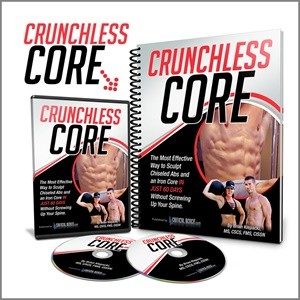
Let me tell you about Evelyn. When you surf through Instagram and see women doing pull-ups, what do you normally see?
Unfortunately, you see very few women banging out pull-ups, as many women have been falsely led to believe that they are not capable of performing them. Many others are not training for pull-ups in a way that is conducive to success. Most of the females you tend to see thriving at pull-ups are elite athletes in their twenties or early thirties.
Not Evelyn, though. She happens to be in her late fifties, and can routinely perform a minimum of six pull-ups on a dime. At a time when most people attribute their lack of ability to aging, Evelyn is putting them to shame.
I’d be lying if I told you it has always been this way.
When Evelyn first came to me, she was suffering from debilitating neck and back discomfort.
For DECADES.
Life certainly wasn’t easy for her. Forget doing pull-ups. Getting groceries, walking her dog, and performing regular daily tasks were, quite literally, a pain in the neck.
So, when Evelyn and I started working together, not only did I have the challenge of helping her reach her goal the ability to do a pull-up but I was also on a mission to help her rebuild her body so that she could properly achieve this goal for the first time in her life. Evelyn accomplished her goal, and we did so as a team.
What did this involve?
Proper Body Positioning
Before Evelyn touched the pull-up bar, we practiced the raw technique of a proper pull-up and worked on mastering the basics.
Core Strength
Think of your body as a chain. When all of the links in this chain are strong, your ability to perform most exercises, including pull-ups, should dramatically improve. You do not want a weak link in your chain, and this applies to your entire body. If your core is weak, and the core includes all of the muscles in your body aside from your arms and legs, your ability to perform pull-ups will likely suffer.
Mastering The Fundamentals
And Following The Key Steps
Many people make the mistake of trying to go from A-Z, and do not follow the essential steps that will actually help them improve their pull-up technique, full body strength, controlled mobility, and stability/tension. As a result, they fail to excel at achieving their pull-up specific goals. Depending on where your starting point is, performing the appropriate pull-up regressions, horizontal pulling exercises, scapula/shoulder controlled mobility exercises, lumbo-pelvic stability exercises, grip exercises, and even lower body exercises, and only progressing when you are ready, will better prepare you to conquer the pull-up. Many people skip key steps and wonder why they aren’t making progress, get frustrated, and quit. Don’t make this mistake. Be patient, and the results will pay off.
So back to Evelyn, all of her training was done progressively, systematically, and consistently, and she reached her goal. In fact, she blew her goal of one pull-up out of the water. Now she is able to perform six. As an unintended bonus, her debilitating back and neck discomfort were gone. She also sculpted the muscles in her upper body, and felt more empowered than ever. With that in mind, it’s time to reevaluate your game plan.
The Ultimate Pull-Up Program
Why these four common exercises aren’t the solution.
If you search the internet for an article on how to get better at pull-ups, you run into the same tips every single time. But there’s a better way.
1. Band Assisted Pull-Ups?You know these. There’s a band looped around the pull-up bar, you put your foot through the band and get a bit of an assist, but at a time when you require the assistance least of all. While this exercise can help you work on your pull-up technique and owning your body positioning, this exercise on its own is not the solution to helping you learn how to perform pull-ups.
2. Machine Assisted Pull-Ups?This is similar to the band assisted pull-up, but in this exercise, your body is actually doing even less work than in the band assisted pull-up. In this variation, you go up to the machine, select the weight you want to assist you, put your knees on the pad, and go to town.
3. Bodyweight Rows/Australian Pull-Ups?Since your body is traveling in more of a horizontal path than vertically, these are not technically pull-ups. And while this is a good exercise and definitely serves a purpose, it isn’t specific enough to the pull-up. So, while these can be a small part of your pull-up training program, you are better off investing most of your time and energy elsewhere.
4. Lat Pull-Downs?This is probably the least specific of all exercises relating to your pull-up progress.
Why don’t these exercises work the way they should?
There are a few reasons:
These exercises will not best prepare you to excel at pull-ups as they all lack in specificity.There is no mention of glute strength. Yes, believe it or not, you need a strong butt to master the pull-up.
There is very little attention devoted to core strength. After you’ve performed pull-ups, you might notice that your “abs” are a little sore or at least feel tired. When you’re performing an actual pull-up, all of the muscles in your torso that surround your spine must work to keep your body stable and from swinging, and help you travel to and from the bar with ease.
There is also very little attention devoted to the muscles that control the movement of your shoulder blades, otherwise known as the scapulae. If these very influential muscles aren’t strong enough, and if you aren’t able to own the movement of your shoulder blades, you will likely struggle to perform a proper pull-up, or at the very least your form will be sloppy. The goal of this program is to help you perform many pull-ups, with outstanding form, and while keeping your body healthy.
While the pull-up is often thought of as an upper body exercise, it is actually a full body exercise.
Without strong core muscles, including the very influential glutes and the muscles that control the movement of your shoulder blades, your pull-up performance will likely suffer.
Once you tackle the above components, your path to dominating the pull-up will be much easier.



















Reviews
There are no reviews yet.